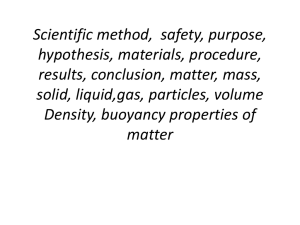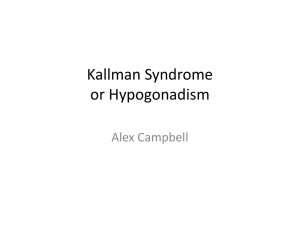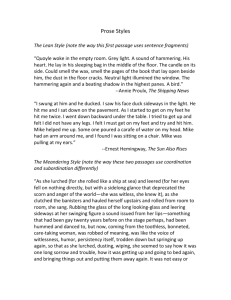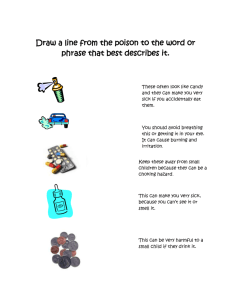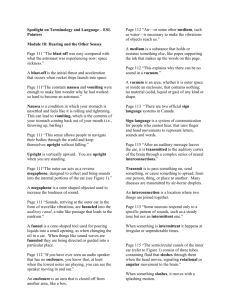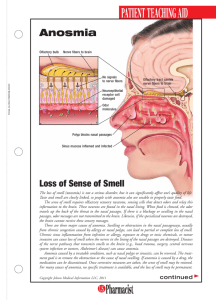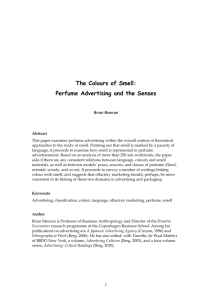Unit 3 Relating
advertisement
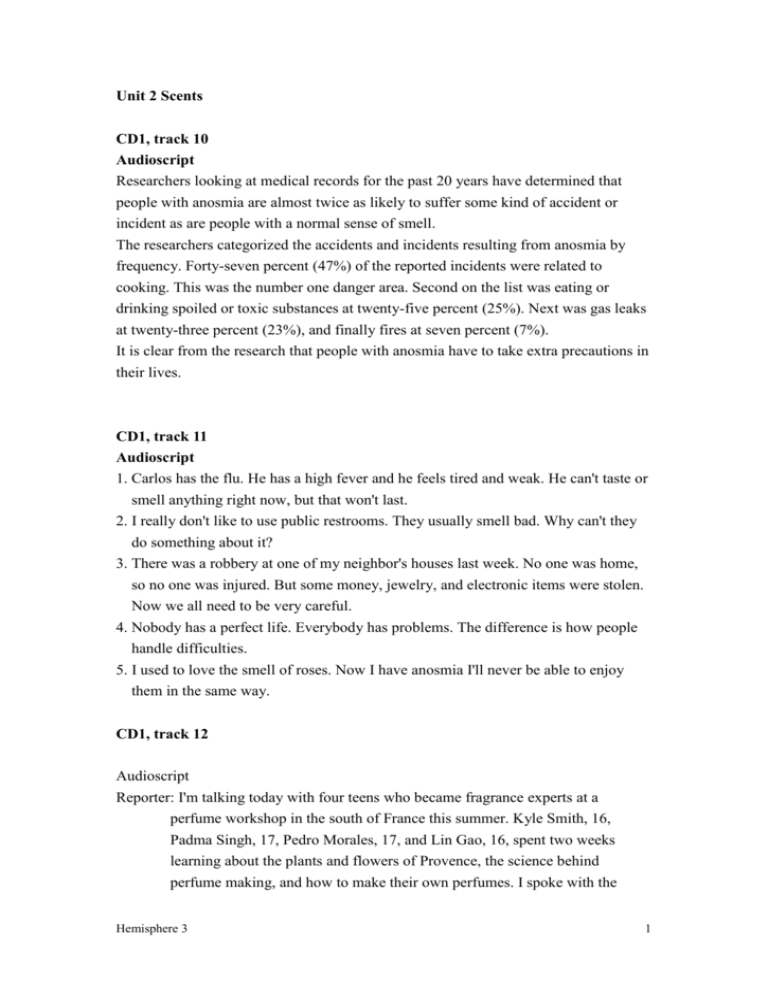
Unit 2 Scents CD1, track 10 Audioscript Researchers looking at medical records for the past 20 years have determined that people with anosmia are almost twice as likely to suffer some kind of accident or incident as are people with a normal sense of smell. The researchers categorized the accidents and incidents resulting from anosmia by frequency. Forty-seven percent (47%) of the reported incidents were related to cooking. This was the number one danger area. Second on the list was eating or drinking spoiled or toxic substances at twenty-five percent (25%). Next was gas leaks at twenty-three percent (23%), and finally fires at seven percent (7%). It is clear from the research that people with anosmia have to take extra precautions in their lives. CD1, track 11 Audioscript 1. Carlos has the flu. He has a high fever and he feels tired and weak. He can't taste or smell anything right now, but that won't last. 2. I really don't like to use public restrooms. They usually smell bad. Why can't they do something about it? 3. There was a robbery at one of my neighbor's houses last week. No one was home, so no one was injured. But some money, jewelry, and electronic items were stolen. Now we all need to be very careful. 4. Nobody has a perfect life. Everybody has problems. The difference is how people handle difficulties. 5. I used to love the smell of roses. Now I have anosmia I'll never be able to enjoy them in the same way. CD1, track 12 Audioscript Reporter: I'm talking today with four teens who became fragrance experts at a perfume workshop in the south of France this summer. Kyle Smith, 16, Padma Singh, 17, Pedro Morales, 17, and Lin Gao, 16, spent two weeks learning about the plants and flowers of Provence, the science behind perfume making, and how to make their own perfumes. I spoke with the Hemisphere 3 1 teens earlier today. Reporter: Kyle, how was your experience at the perfume workshop? Kyle: It was awesome! We learned all about the science of making perfumes. It's a lot more complicated than I thought. You need to know exactly how to mix the ingredients - like the oils, alcohol, and flowers – or it doesn't work. I made a special perfume just for my girlfriend and sent it to her. I was wondering what she'd think of it when I got a call from her at the school. She loved it! Reporter: And how about you, Padma? Padma: :WO, to be honest, I faced some challenges. When I was working with the scents and oils, I got headaches. I also felt pretty homesick most of the time. And I didn't find the whole perfume-making process all that interesting. Provence is very beautiful, but I'm happy to be back home. Reporter: Pedro. Did you enjoy the experience? Pedro: I did. I got really good at identifying the fragrances of the different plants and flowers used to make perfume. I especially like lavender Provence is famous for its lavender . flowers and perfumes. I really came to appreciate how important our sense of smell is. The experience changed my life. Reporter: And finally, Lin. Could you talk a little bit about your experience? Lin: Certainly. Provence is a fantastic part of France. The perfume industry has been a part of this area for centuries. It was so interesting to learn all aboutthe history. And I also have to mention how delicious the food was and how friendly the French people were. I'm studying more about France online now because I want to go hack next year. CD1, track 13 Audioscript A: We'll have a new product ready for the market soon. Pet perfumes! B: Tell me more about this. It's something I might be interested in. A: Well, the idea came from a survey of our pet food customers. They wanted their pets to smell better. B: I'd like my dog to smell better when he comes in the house. But I don't think I'd want him to smell like flowers. A: Right. Most pet owners prefer a fresh, simple smell. B: Hmm. Could you explain what fresh means, exactly? A: Well, according to our survey, "fresh" smells like the outdoors, or a light soap. B: Oh. That's interesting. Is there anything else you'd like to tell me about these perfumes? Hemisphere 3 2 A: The names! Our cat fragrance is Meow and the fragrance for dogs is Woof. B: I'd like to know if these perfumes are available to order now. CD1, track 14 Audioscript 1. Narrator: Listen to a meeting between an advertising representative and an owner of several bakeries. You may take notes as you listen. Then answer the question. Woman: Thank you for meeting with me today. I believe you will be happy with some of the new ideas we have for marketing your new bakeries around town. Man: Great. I'm looking forward to hearing your ideas. Woman: Excellent, then let's get started. In addition to the print marketing we are already doing for you—your brochures, coupons, and menus—we have come up with a way to get the smell of your freshly baked products out to the people. Man: Oh really? How is that? Woman: Well, a couple of ways. One thing we could do is filter the smell from your kitchen onto the sidewalks surrounding your bakeries. As people walk by, they will get the scent of your delicious breads, pies, and cakes being freshly baked. I know that with one whiff of your bread—what is the one that is so popular that I sampled last time I was here? Man: The cinnamon raisin bread? Woman: Yes! With one whiff of your cinnamon raisin bread, people are going to want to buy it immediately. Man: That's a good idea. My customers are always saying that they love coming in the shop even if it is just to smell the bread! Woman: Exactly! That's what we're talking about! The smell will sell the bread! Now—another idea we had was that instead of just sending out the plain coupons that we've been mailing to your customers, we could add a "scratch and sniff" strip on each coupon. Man: A what? Woman: You know—scratch and sniff. Remember when we were kids and there were strips of scents that you scratch? You scratch off a layer of coating and then you smell the scent on the paper. There were all sorts of scents—fruity flavors, chocolate, ones ... Man: Yes—now I remember! Woman: What we could do is apply a "scratch and sniff" strip to each coupon we send out—like, cinnamon or chocolate. Man: I like it—but do you think all of this smelling will really work? Woman: One hundred percent. There has been a lot of research done on olfactory Hemisphere 3 3 marketing and the results are amazing! Some reports say that malls that infused a citrus smell in the air had an increase in sales by $55 to $90 per customer during typically slow business periods. With research and results so convincing as this, many businesses are adding olfactory marketing to their campaigns. Man: You sold me. How do we begin? CD1, track 15 Audioscript Narrator: Listen again to two parts of the conversation and answer the question after each part. First passage: Man: I like it—but do you think all of this smelling will really work? Narrator: What does the owner of the bakeries think about the marketing ideas for using smell to sell bread? Narrator: Second passage: Woman: With research and results so convincing as this, many businesses are adding olfactory marketing to their campaigns. Narrator: What does the advertising company representative think about the effectiveness of olfactory marketing? Hemisphere 3 4


